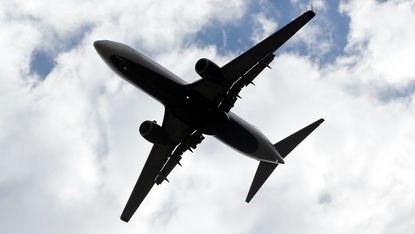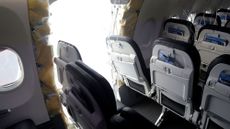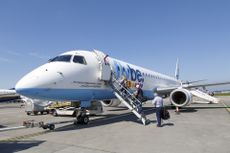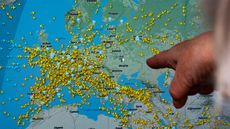Boeing blowout: how safe is flying?
The Week looks at the statistics on modern air travel safety

Experts say we have little reason to fear taking to the skies in modern aircraft but how safe is air travel really?
Aviation has hit the headlines for all the wrong reasons this week after an emergency exit door on an Alaska Airlines plane blew out during a flight, leaving a gaping hole in the fuselage.
The incident took place just minutes after the Boeing 737 Max 9 took off from Portland International Airport in Oregon on Friday with 171 passengers and six crew members on board, forcing the aircraft to make an emergency landing.
Subscribe to The Week
Escape your echo chamber. Get the facts behind the news, plus analysis from multiple perspectives.

Sign up for The Week's Free Newsletters
From our morning news briefing to a weekly Good News Newsletter, get the best of The Week delivered directly to your inbox.
From our morning news briefing to a weekly Good News Newsletter, get the best of The Week delivered directly to your inbox.
No passengers were killed or seriously injured during the incident, but the US Federal Aviation Administration has temporarily grounded hundreds of Boeing 737 Max 9 aircraft for inspection, a decision Boeing said it "fully supports".
The aircraft manufacturer is under scrutiny after a spate of issues involving its aircraft. In 2018, 189 people were killed after a Lion Air Boeing 737 Max 8 crashed into the sea shortly after taking off from Jakarta in Indonesia. The following year, another 737 Max 8 plane, this one operated by Ethiopian Airlines, crashed soon after take-off at Addis Ababa, killing 157 people.
With air accidents frequently in the news, The Week examines the statistics on just how much risk airline passengers are taking.
What do the numbers say?
On the whole, air travel is becoming safer and safer. According to a 2020 Massachusetts Institute of Technology (MIT) study, between 2008 and 2017, there was one fatality for every 7.9 million passengers who boarded a flight. Between 1998 and 2007, that figure stood closer to one death per 2.7 million passengers.
"The worldwide risk of being killed has been dropping by a factor of two every decade," said Arnold Barnett, the author of the MIT paper. "The pace of improvement has not slackened at all even as flying has gotten ever safer and further gains become harder to achieve. That is really quite impressive and is important for people to bear in mind."
Last year was one of the safest years on record for commercial air travel, after only two fatal air crashes occurred in 12 months, compared to seven in 2022.
In both cases, propeller aircraft crashed on domestic flights, resulting in 86 deaths, fewer than half the 178 fatalities in 2022, according to a report by Dutch air safety organisation To70.
And no fatal aircraft accidents in 2023 involved international flights or commercial passenger jets.
More than 1,000 deaths per calendar year “was commonplace” until around 15 years ago, said The Daily Telegraph. In 2005 there were 1,056; the figure for 1996 was 1,924.
According to the Aviation Safety Network, the average yearly number of aviation deaths has been falling steadily since 1997, largely thanks to the continuing safety-driven efforts by international aviation organisations.
What are your chances of dying in a plane crash?
You are far more likely to die driving to the airport than you are to be involved in a deadly plane accident, the evidence suggests.
According to a 2017 Harvard University study, the odds that your plane will crash are one in 1.2 million, and the odds of dying from a crash are one in 11 million. Your chances of dying in a car accident, meanwhile, are one in 5,000.
That means a person could, on average, fly once a day for four million years before succumbing to a fatal crash.
And even if you are unlucky enough to be involved in an air accident, you are likely to survive it.
A US National Transportation Safety Board review of national aviation accidents from 1983-1999 found that more than 95% of aircraft occupants survived accidents, including 55% in the most serious incidents, reported the BBC in 2018.
So there’s nothing to fear then?
Not quite. Although there were only two fatal air accidents in 2023, air safety organisation To70 noted a "disturbing number of runway incursions", where an aircraft entered the runway when it was occupied or when another aircraft was close to landing. On 2 January, five crew members of a Japanese coast guard plane were killed when a Japan Airlines jet struck their aircraft when it landed at Tokyo’s Haneda airport.
The To70 report also noted that aviation remains a "risk-laden industry" and said that as airports reach pre-Covid levels of movement "a number of issues have not gone away".
It noted with concern the "attitude of the Russian authorities" in response to the plane crash in which the head of the Wagner Group, Yevgeny Prigozhin, was killed.
It also said that an increasing focus on sustainable aviation, such as the use of new fuels, required "vigilance" to ensure that developments in this field "do not have an impact on safety".
Pilots suffering from mental health issues and fatigue also remain among the biggest safety concerns for the industry.
Those fears are shared by Ashley Nunes, who studies transportation safety and regulatory policy at MIT. "Limiting our perception of safety to fatal crashes alone narrows our appraisal of risk," he said in an article for Canadian newspaper The Globe and Mail in 2018.
"Human errors that can jeopardise air safety continue to occur throughout the industry," he wrote, citing a survey in which more than 95% of pilots admitted to landing their plane when conditions dictated they shouldn’t.
The survey, completed by 2,340 pilots worldwide, "paints a worrying picture about the current and future state of air safety", said Nunes.
What is the consensus?
Although there have been a number of headline-grabbing aviation disasters in recent years, the statistics are clear: flying is safer than it has ever been. However, that does not mean air travel is completely without risk.
Create an account with the same email registered to your subscription to unlock access.
Sign up for Today's Best Articles in your inbox
A free daily email with the biggest news stories of the day – and the best features from TheWeek.com
Sorcha Bradley is a writer at The Week and a regular on “The Week Unwrapped” podcast. She worked at The Week magazine for a year and a half before taking up her current role with the digital team, where she mostly covers UK current affairs and politics. Before joining The Week, Sorcha worked at slow-news start-up Tortoise Media. She has also written for Sky News, The Sunday Times, the London Evening Standard and Grazia magazine, among other publications. She has a master’s in newspaper journalism from City, University of London, where she specialised in political journalism.
-
 'Horror stories of women having to carry nonviable fetuses'
'Horror stories of women having to carry nonviable fetuses'Instant Opinion Opinion, comment and editorials of the day
By Harold Maass, The Week US Published
-
 Haiti interim council, prime minister sworn in
Haiti interim council, prime minister sworn inSpeed Read Prime Minister Ariel Henry resigns amid surging gang violence
By Peter Weber, The Week US Published
-
 Today's political cartoons - April 26, 2024
Today's political cartoons - April 26, 2024Cartoons Friday's cartoons - teleprompter troubles, presidential immunity, and more
By The Week US Published
-
 Boeing facing more questions after mid-air panel blowout
Boeing facing more questions after mid-air panel blowoutSpeed Read US authorities ground latest Max 737 jets after 'catastrophic' crashes involving older models
By Rebekah Evans, The Week UK Published
-
 SUVs: the scourge of the streets?
SUVs: the scourge of the streets?Talking Point 'Hulking vehicles' are more dangerous and polluting than smaller cars but offer a sense of safety
By Harriet Marsden, The Week UK Published
-
 The 100-year-old railway Mexico hopes will rival the Panama Canal
The 100-year-old railway Mexico hopes will rival the Panama CanalUnder the radar The route will run across Mexico's narrowest point, connecting the Gulf of Mexico and the Pacific Ocean
By Sorcha Bradley, The Week UK Published
-
 Flybe: turbulence prompts a second nosedive
Flybe: turbulence prompts a second nosedivefeature Airline’s latest collapse is a blow to ‘regional connectivity’
By The Week Staff Published
-
 The Week Unwrapped: Factories, drug money and scanners
The Week Unwrapped: Factories, drug money and scannerspodcast Will a UK lawsuit lead to better working conditions in Thailand? Could a new way of funding antibiotics help tackle resistance? And is airline security about to change for the better?
By The Week Staff Published
-
 Pros and cons of e-scooters
Pros and cons of e-scootersPros and Cons Enthusiasts praise their convenience but sceptics say they are dangerous and environmentally damaging
By Chas Newkey-Burden Published
-
 The Week Unwrapped: Chinese protests, supersonic jets and university cheats
The Week Unwrapped: Chinese protests, supersonic jets and university cheatspodcast Will mortgage strikes force China to change course? Does Concorde finally have a worthy successor? And what’s behind a rise in cheating?
By The Week Staff Published
-
 Is flight tracking the new Netflix?
Is flight tracking the new Netflix?In Depth Hundreds of thousands follow flights of the famous but privacy concerns have led to backlash
By The Week Staff Published